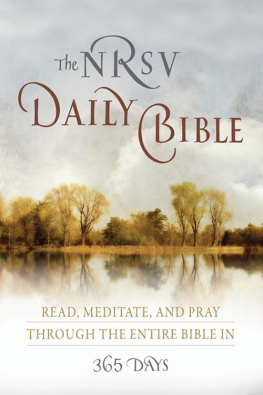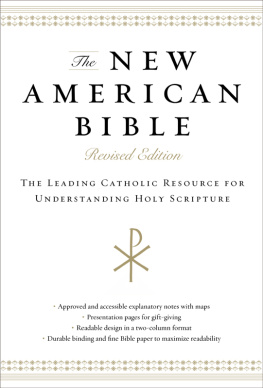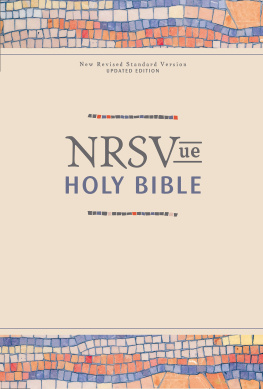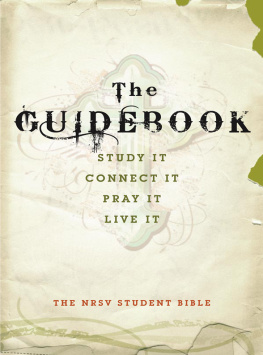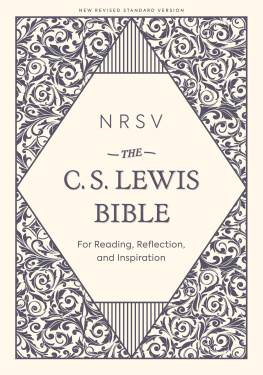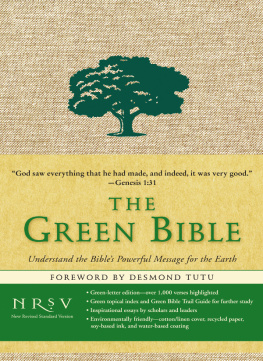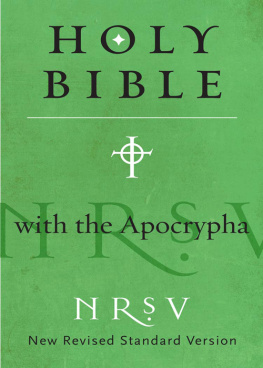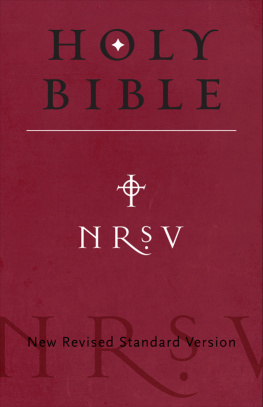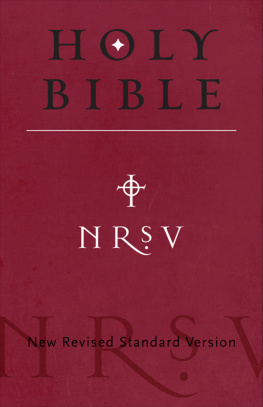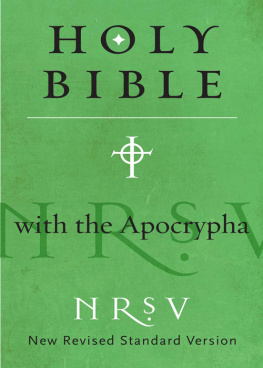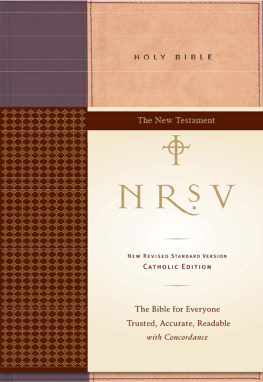The NRSV Daily Bible
Read, Meditate, and Pray Through the Entire Bible in 365 Days
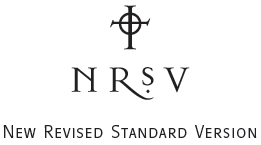

The following abbreviations are used for the books of the Bible:
| Gen |
| Ex |
| Lev |
| Num |
| Deut |
| Josh |
| Judg |
| Ruth |
| 1 Sam |
| 2 Sam |
| 1 Kings |
| 2 Kings |
| 1 Chr |
| 2 Chr |
| Ezra |
| Neh |
| Esth |
| Job |
| Ps(s) |
| Prov |
| Eccl |
| Song |
| Isa |
| Jer |
| Lam |
| Ezek |
| Dan |
| Hos |
| Joel |
| Am |
| Ob |
| Jon |
| Mic |
| Nah |
| Hab |
| Zeph |
| Hag |
| Zech |
| Mal |
| Mt |
| Mk |
| Lk |
| Jn |
| Acts |
| Rom |
| 1 Cor |
| 2 Cor |
| Gal |
| Eph |
| Phil |
| Col |
| 1 Thess |
| 2 Thess |
| 1 Tim |
| 2 Tim |
| Titus |
| Philem |
| Heb |
| Jas |
| 1 Pet |
| 2 Pet |
| 1 Jn |
| 2 Jn |
| 3 Jn |
| Jude |
| Rev |
In the notes to the books of the Old Testament the following abbreviations are used:
| Ant. | Josephus, Antiquities of the Jews |
| Aram | Aramaic |
| Ch(s) | Chapter(s) |
| Cn | Correction; made where the text has suffered in transmission and the versions provide no satisfactory restoration, but where the Standard Bible Committee agrees with the judgment of competent scholars as to the most probable reconstruction of the original text. |
| Gk | Septuagint, Greek version of the OT |
| Heb | Hebrew of the consonantal Masoretic Text of the OT |
| Josephus | Flavius Josephus (Jewish historian, ca. 3795 CE ) |
| Macc. | The book(s) of the Maccabees |
| Ms(s) | Manuscript(s) |
| MT | The Hebrew of the pointed Masoretic Text of the OT |
| OL | Old Latin |
| Q Ms(s) | Manuscript(s) found at Qumran by the Dead Sea |
| Sam | Samaritan Hebrew text of the OT |
| Syr | Syriac Version of the OT |
| Syr H | Syriac Version of Origens Hexapla |
| Tg | Targum |
| Vg | Vulgate, Latin Version of the OT |
Project Editor
Marlene Baer Hekkert
Managing Editor
Terri Leonard
Cover Art Direction
Michele Wetherbee
Produced with the assistance of The Livingstone Corporation (www.Livingstonecorp.com).
Project staff includes:
Katie Arnold
Andy Culbertson
Lois Jackson
Kathy Ristow
Tom Ristow
Ashley Taylor
Linda Taylor
Linda Washington
Neil Wilson
Interior design by Larry Taylor
Many daily Bibles rearrange Scripture to fit a particular reading plan. The NRSV Daily Bible maintains the traditional Scripture sequence to guide you in your daily reading. Experiencing the biblical narrative from cover to cover helps you contemplate Scripture and reflect on the rich truths of the Bible. Each of the 365 daily readings and Bible book introductions has been assembled in a format that follows the practice of lectio divina, Latin for divine reading, spiritual reading, or holy reading and represents an ancient method of prayer and scriptural reading intended to promote communion with God and to provide spiritual formation. The principles of lectio divina can be traced back to the year 200 A.D. and became codified in the monastic rules of Sts. Pachomius, Augustine, Basil, and Benedict.
The practice of lectio divina, which includes reading Scripture, meditation, contemplation, and prayer, will draw you into a closer communion with God. Biblical meditation and contemplation will also allow you to ponder, reflect, and even memorize passages so they can be held up in the mind for attention and examination. The apt picture of the saint meditating on Scripture in the same way that a cow lingers over the mastication of cud brings us close to the aim of contemplationthe unhurried encounter between the human soul and the Word.
To deepen your experiential practice of reading Scripture, each day will include a contemplative reading from classic and contemporary writers as it relates to a theme or specific text in that section. These contemplations will also invite you to look along Scripture with someone who has been this way before.
The NRSV Daily Bible seeks to help you look at and along what God has said and what others have written about Gods Word. You can stand back and examine, or you can step forward and experience. In either case, realize that at any moment along the way you may have repeated awareness of being examined. As we contemplate God; God contemplates us.
The NRSV Daily Bible has been structured for reading throughout a year, or unhurriedly at your own pace. Since the days are numbered, and not assigned by date, you can choose to start on January 1 or at any time throughout the year. Each daily reading will guide you in the practice of lectio divina, following a pattern of four related disciplines that will usher you into Gods presence. These steps are as follows:
ReadRead the Bible passage at an unhurried pace. Take note of the style of text you are reading and consider how the reading challenges, comforts, intrigues, confronts, and guides you in your understanding of God and Gods presence in your life.
MeditateReflect and ruminate on God and the specific verses chosen from the longer passage. Take enough time with the verses to be able to hold them in your mind as you read the contemplation.
ContemplateConsider the thoughts of those who have left a record of their meditations on Scripture as you seek to develop a meditation and contemplation pattern of your own. You are listening in on the devotional dialogue between God and others who have gone before you. Several questions will follow each excerpt to aid your reflections.
PrayRespond to the passage by opening your heart to God. This is not primarily an intellectual exercise, but is intended to encourage an ongoing conversation with God.
These steps have been tried and proven throughout the centuries as reliable steps into Gods presence. When undertaken thoughtfully, deliberately, and repeatedly, they lead us toward healthy spiritual formation.
Aim for a consistent pace throughout the year. Linger over the Bible passages as well as the contemplative thoughts. As you do, remember that you are in the company of seasoned travelers on Gods road. Take enough time to consider the questions that are included with the contemplative notes, and use them to occupy your mind during moments of the day. The included prayers are meant to be suggestions as you reach out to God. And if you find your mind and heart repeatedly stirred by the words of a particular contributor, make it a point to read her or his books, filling in the context for the brief excerpts included in this Bible.

